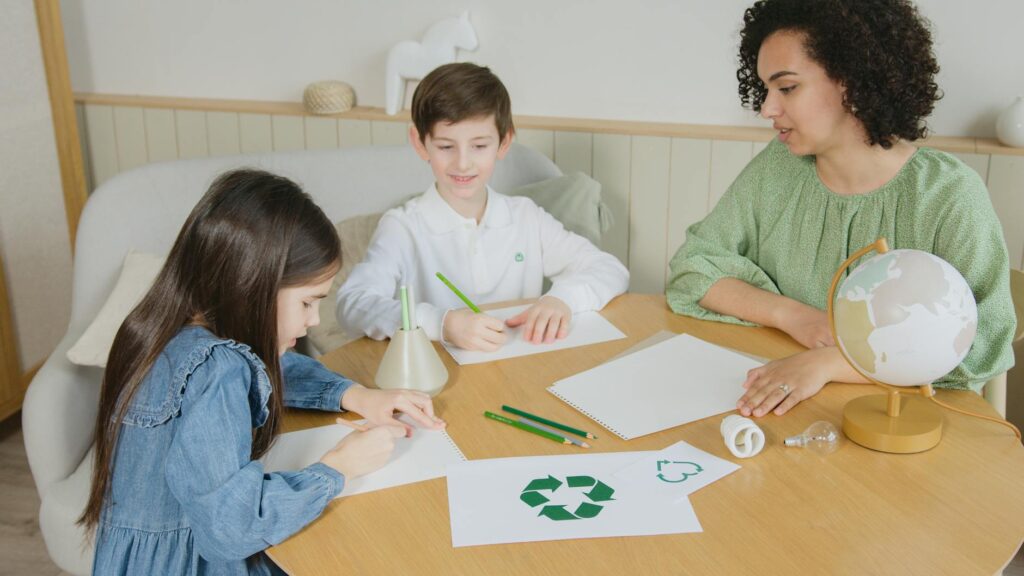In eighth grade, my mom and I sat in front of Mr. Boersma, my straightlaced math teacher. “Penny is an excellent student and excels in math,” he tells my mother.
“Penny isn’t good in math, just like me,” my mom replies, directly contradicting the man who presumably is the expert on my mathematical abilities. “I have never been good at math, and neither has she.”
My teacher cocks his head with a barely raised eyebrow. “Her test scores show her being one of the top students.” He looks over at me for confirmation.
“Math has always been harder for me than other subjects,” I tell him, looking down.
Despite my A’s in math throughout my school years, my Mom believed that math just wasn’t my subject. I don’t know if she had a preconceived idea that girls couldn’t be good in math or an expectation that because she herself had less success in math than language arts that I would be similar. Probably both.
At one point in my career, I sought a high school position as an English teacher at a time when there were hundreds of applicants for every opening in the region of Michigan where I lived. I decided to add a certification in math to improve my marketability. I studied to catch up on my math skills and did quite well in Calculus I.
My Calculus II class was a different story. I had a notoriously impossible professor. My advisor literally told me to drop the class and take it with a different professor because of his reputation. However, that class was the only one that worked with my schedule.
Facing this challenge turned out to be life-changing for me. I worked with other math geeks to survive. We hung out in the math center at the college where even the graduate level students often had to call our professor to get help, so they could help us. I loved the puzzle- solving aspect, the theory, and working with my classmates to solve the nearly impossible assignments. The other students accepted me as one of them, and I finally put to rest the whole “good at math” question.

Fixed Mindset Versus Growth Mindset
In this example, my mom had a classic fixed mindset. She felt that either you were naturally “good at math” or in my case “not good at math”. A fixed mindset is a belief that people are born with a set of talents, abilities, or intellect and that those are fixed. You either have them or you don’t. Often labeling is a result of a fixed mindset, and labels are “sticky”. Examples of fixed mindset labels include gifted, uncoordinated, trouble, smart, not artistic, and athletic, just to name a few.
Fixed mindsets came from past beliefs by behavioral and neural scientists who used to think that our intelligence was fixed. In the last ten years or so, we have learned that people can develop neural connection in our brain and strengthen them, increasing our intellectual capacity and abilities.
For kids, new research has shown that having a fixed mindset leads to all kinds of trouble. Kids who have a fixed mindset have been shown to be more likely to
- Avoid challenges: “I might not be able to do it, so I am not going to try.”
- Give up easily: “I’m just not good at that, so I don’t want to do it anymore.”
- Afraid to make mistakes: “If I mess up maybe that means I am not as smart as everyone thinks I am.
Even “good” labels can lead to a fixed mindset. It can increase anxiety and lead to a fear of failure which doesn’t lead to learning and growth.

3 Keys to Growth Mindset: Persistence, Effort, and Practice
Fortunately for me, Mr. Boersma planted a seed during that parent teacher conference that eventually led me to challenge the label/fixed mindset of “not good at math.” I actively worked on how I thought of myself and math, but mostly, I just dug in and worked, applying the three keys of persistence, effort, and practice.
A growth mindset is a belief that with these 3 keys, a person can get better. It’s a mindset that while they might not be good at something now, with persistence they can improve. Intelligence and abilities are not fixed. Bodies and brains can learn and grow. Having to work hard at something is not a sign of a lack of ability, and those who learn to practice, focus on effort and persistence are more likely to become successful at achieving their goals.
This two-minute video explains the brain science behind growth mindset so well!

Parenting for a Growth Mindset
As a parent fostering a growth mindset starts with us. We need to see our kids as capable of growing and learning. Even if they don’t start out as good at something, encouraging them to stick with it can make a difference. Allowing and even providing challenges gives them an opportunity to practice the 3 keys by learning something new and difficult. Below are some specific tips for raising your child with a growth mindset.
Praise them for effort
Instead of praising intelligence or talent (smart, funny, artistic, athletic) which they don’t have control over. Praise them for their effort, striving, and persistence in overcoming challenges. You can also give them positive attention by noticing what they are doing that is working.
“You worked so hard and look what happened, you did it.”
“I noticed that you kept trying different approaches until you figured it out.”
Reframe mistakes as learning
Remember they aren’t making mistakes. They are learning what works and what doesn’t.
“Hmm that didn’t work. What else can you try?”
“It looks like you didn’t do as well as you wanted on that paper. Do you have ideas for how to do better on your next paper or would you like some suggestions?”
Get into the details
Paying attention to the strategies that your child is using helps them feel more empowered and in control of their learning and growth. Suggesting alternative strategies is a growth mindset approach because it helps them see that they can learn by finding a different approach. Then once they hit a barrier on their own, they are more likely to look for other ways to solve the problem.
“You added color to your drawing. Do you like how it turned out?”
“I noticed that you have been studying earlier and in smaller chunks. Do you think that is why you are doing better on your tests?”
“Those blocks stayed up better when you had more blocks on the bottom. What happens if you make the bottom even bigger?”
Model Growth Mindset
You can model growth mindset by challenging yourself and letting your child see your persistence, effort, and practice. Seeing mistakes as learning opportunities has been the hardest change for me in adopting a growth mindset. I model growth mindset by letting my children know that I am working on it and letting me see me stick with it. They also enjoy helping me see my mistakes as learning.
“I almost gave up climbing this hill but look how far we can see. I am glad I did it.” “This puzzle is too easy, so it’s a little boring. Let’s try something a little harder.”
“Oops that didn’t work. I will try to go at it a different way next time, so it doesn’t happen again.”

Final Thoughts
Growth mindset is exciting because kids can really be freed up to pursue their interests and develop skills that will stay with them for their entire lives. Once you adopt the principles of a growth mindset, it changes you as a parent. If you hear your child say something like “I am not good at fractions,” you can see immediately the fixed mindset. Changing to a growth mindset is as easy as adding the word “yet.” “You are not good at fractions, yet.”
Fostering a growth mindset means that your child will have more resilience and be able to bounce back faster and easier. They will have a little more grit.
“No matter what your ability is, effort is what ignites that ability and turns it into accomplishment.” Carol Dweck
Want to read more about growth mindset for parents? Read this:
KM Educational Consulting
K-12 Consulting, Coaching and Professional Development


